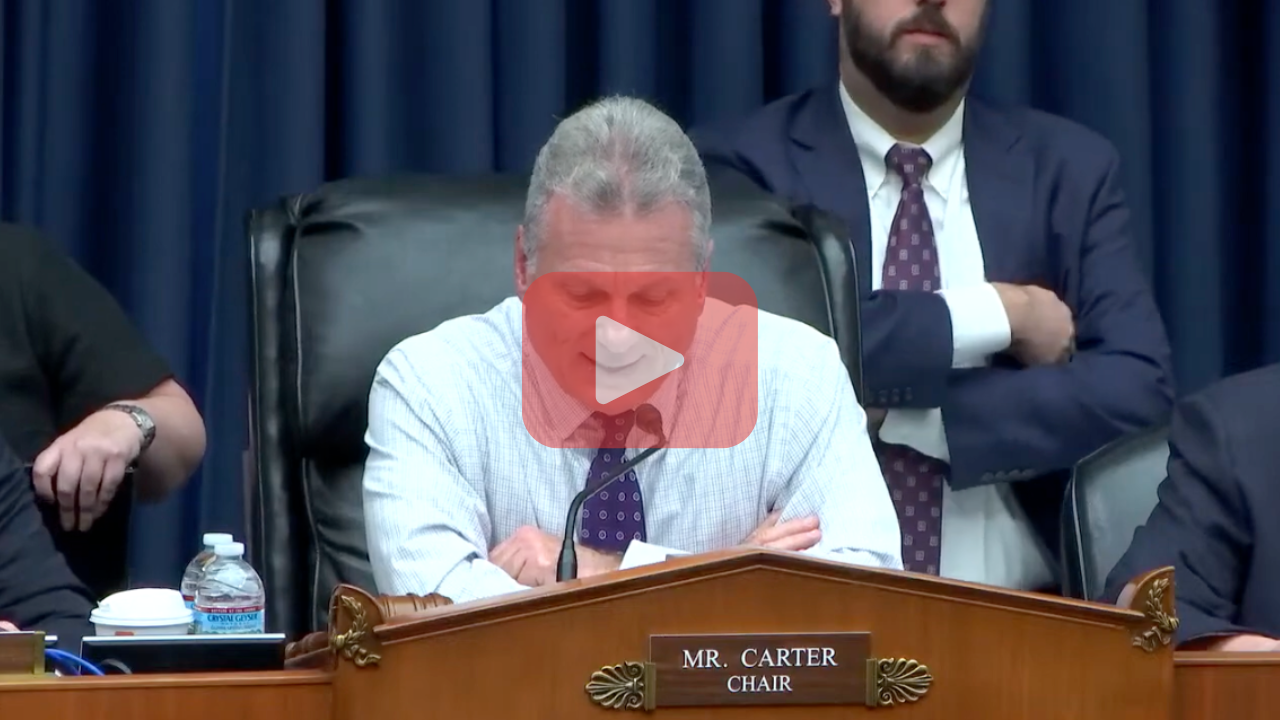Press Releases
Subcommittee Chair Carter Opening Remarks at Environment Subcommittee Markup of a Bill to Modernize Air Quality Standards
Washington,
March 6, 2024
Tags:
Environment
WASHINGTON, D.C. — House Energy and Commerce Environment, Manufacturing, and Critical Materials Subcommittee Chair Earl L. "Buddy" Carter (R-GA) delivered the following opening remarks at today’s Environment Subcommittee markup of a bill to modernize air quality standards.
NAAQS PROCESS IS BROKEN “Just three weeks ago, this Subcommittee held a legislative hearing on the print being marked up today. “We received testimony from an air quality regulator in my home State of Georgia, the National Association of Manufacturers, and the American Forest and Paper Association. We also heard from the litigation arm of the environmental left, Earthjustice. “The testimony we received was clear. The NAAQS process is broken from beginning to end. “Even as standards approach natural background levels, the Clean Air Act’s rigid timelines and outdated assumptions are making it near impossible for states to implement effective plans. “And while states work on one set of standards, EPA imposes another round, all while ignoring the major sources of air pollution and the practical experience of state regulators. “The result is impractical requirements that create permit gridlock and little prospect for meaningful improvement in air quality.” BURDENSOME REGULATIONS UNDERMINE AMERICAN LEADERSHIP “Meanwhile, America is less competitive. High-paying jobs will leave our shores, only for heavy manufacturing and production of critical goods to be done in foreign locations with weaker environmental and labor standards. “Today’s Committee Print makes practical reforms to the NAAQS process to help states effectively address air pollution, while avoiding the harmful impacts in the current process. “The legislation extends the mandatory timeline of review of air quality standards to provide the Agency and the states more time to implement existing standards and to assess and develop revisions to the standards. “It provides more discretion for the EPA Administrator to focus on actual attainability of the standard when choosing among a range of standards found to be protective of public health. “The bill also provides essential exclusions for actions to mitigate wildfires, something that we know is the largest contributor to particulate matter concentrations.” SUPPORTING STATES IN THEIR AIR QUALITY EFFORTS “Some new additions to today’s draft based on feedback from our hearing include measures to ensure that States are provided the opportunity to revise their State Implementation Plans when EPA finds deficiencies. “It also provides language to ensure that the State Air Pollution Control Agency representatives on the Clean Air Science Advisory Committee come from different regions of the country. “Lastly, the legislation provides the regulated community certainty that they will be able to construct their facilities, provide high paying jobs, and bolster our manufacturing base if they completed their preconstruction permitting prior to the final designation of attainment areas for the recent PM2.5 Standards. “Contrary to assertions that Republicans are putting ‘polluters over people,' we are simply making practical fixes that will help the states implement important health standards and avoid harmful impacts to people’s health and welfare. “Nothing in the legislation prevents the EPA from updating air quality standards faster than every 10 years if the Administrator determines it necessary to protect public health. Nothing prevents states from imposing stricter standards if they choose. “We actually reduce unnecessary burdens on states—like California—that are doing everything possible to address serious air quality problems. And under this legislation, the regulated community must apply the best available control technology and lowest achievable emission rate technology at covered facilities. “Today’s draft legislation has many features that should garner bipartisan support. “For example, there are commonsense reforms to ensure that actions to mitigate wildfires are not discouraged, States are assisted in crafting implementation plans to meet their own unique needs, and the West Coast is not indiscriminately punished because of air pollution from China that is out of their control. “I encourage my Democratic colleagues to work with us to reform the NAAQS process to ensure that it works for the regulated community and co-regulators. “As a former medical professional and the current Chair of a panel that features numerous Medical Doctors, I echo Dr. Joyce’s comments from our legislative hearing that protecting our constituents' health is not a slogan to us. It is what several of us have dedicated our lives to. “I look forward to marking up today’s legislation that will reform an antiquated process, lay the groundwork for American manufacturing to succeed, and do it all while protecting our constituents’ health.” |


